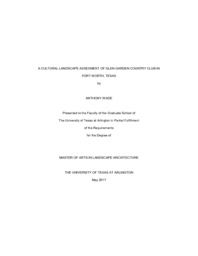
ATTENTION: The works hosted here are being migrated to a new repository that will consolidate resources, improve discoverability, and better show UTA's research impact on the global community. We will update authors as the migration progresses. Please see MavMatrix for more information.
Show simple item record
| dc.contributor.advisor | Hopman, David D | |
| dc.creator | Wade, Anthony Joseph | |
| dc.date.accessioned | 2023-09-08T15:35:38Z | |
| dc.date.available | 2023-09-08T15:35:38Z | |
| dc.date.created | 2017-05 | |
| dc.date.submitted | May 2017 | |
| dc.identifier.uri | http://hdl.handle.net/10106/31635 | |
| dc.description.abstract | In 2014, having just been sold, Glen Garden Country Club in Fort Worth, Texas closed for the final time having been open for over 100 years also producing two of the top ten golfers in PGA history, Ben Hogan and Byron Nelson. This research presents a study in assessing Glen Garden as a cultural landscape.
This research seeks to answer two question: Was Glen Garden Country Club a cultural landscape? What is the perception of responsibility for advocacy efforts? This case study was adapted from the Francis model and designed to fit the unique context of Glen Garden Country Club to document the club as it was when it closed. The secondary approach to research in this study uses ethnographic interviews to go beyond the baseline data of the case study to identify important concepts.
Glen Garden was created by H.H. Cobb from the O.K. Cattle Company cow pasture land in 1912. In just over a century, this club developed some hall of fame golfers and others, interconnected with the community around it, was sold to a whiskey distillery, and according to the present research, became a cultural landscape. | |
| dc.format.mimetype | application/pdf | |
| dc.language.iso | en_US | |
| dc.subject | Cultural Landscape | |
| dc.subject | Landscape Architecture | |
| dc.subject | Glen Garden Country Club | |
| dc.title | A Cultural Landscape Assessment of Glen Garden Country Club in Fort Worth, Texas | |
| dc.type | Thesis | |
| dc.date.updated | 2023-09-08T15:35:38Z | |
| thesis.degree.department | Landscape Architecture | |
| thesis.degree.grantor | The University of Texas at Arlington | |
| thesis.degree.level | Masters | |
| thesis.degree.name | Master of Landscape Architecture | |
| dc.type.material | text | |
| dc.creator.orcid | 0000-0003-2173-6300 | |
Files in this item
- Name:
- WADE-THESIS-2017.pdf
- Size:
- 4.688Mb
- Format:
- PDF
This item appears in the following Collection(s)
Show simple item record


